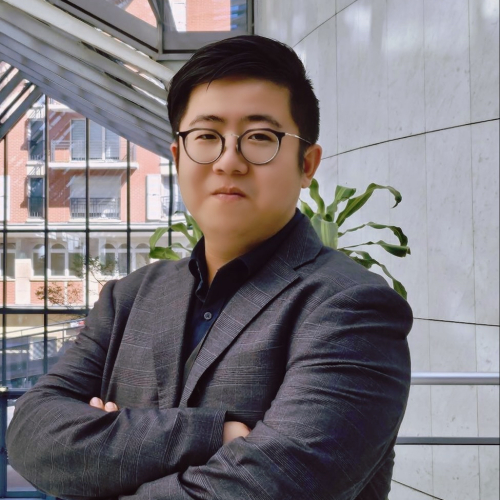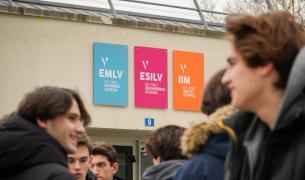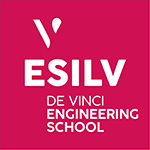
Enseignant-chercheur en informatique, spécialisé en traitement d'images et intelligence artificielle. Titulaire d'un doctorat en Electronique, microélectronique, nanoélectronique et micro-ondes de l'Université de Lille (2023) et d'un post-doctorat à Télécom Sud Paris, j'ai travaillé sur l'application de l'IA aux images médicales. Mes recherches portent sur la classification, la détection et la génération d'images, avec un intérêt particulier pour le traitement d'images par l'IA générative et ses applications en santé.
Ni ZHU; Ruiwen He; Zhiqiang Wang
Dans: Engineering Applications Of Artificial Intelligence, vol. 145, p. 110160, 2025.
@article{zhu_3394,
title = {CarNet: A generative convolutional neural network-based line-of-sight/non-line-of-sight classifier for global navigation satellite systems by transforming multivariate time-series data into images},
author = {Ni ZHU and Ruiwen He and Zhiqiang Wang},
url = {https://www.sciencedirect.com/science/article/pii/S0952197625001605?via%3Dihub},
year = {2025},
date = {2025-04-01},
journal = {Engineering Applications Of Artificial Intelligence},
volume = {145},
pages = {110160},
abstract = {Urban environments present significant challenges to commercial Global Navigation Satellite Systems (GNSS) receivers due to degraded satellite visibility and Non-line-of-sight (NLOS) receptions. Mitigating NLOS receptions for GNSS is essential, especially for safety-critical and reliability-critical location-based applications. Traditional physical error channel propagation modeling encountered bottlenecks since the NLOS and multipath errors cannot be modeled accurately in complex urban environments. Data-driven methods show significant potential for effectively classifying GNSS Line-of-sight (LOS) and NLOS. This paper proposes the CarNet - a generative Convolutional Neural Network (CNN)-based GNSS LOS/NLOS classifier by transforming multivariate time-series data into images. CarNet comprises two modules: an image generator and an image classifier. The image generator enriches and augments the original 1-dimension feature vector into 2-dimension feature maps and the image classifier uses an inception-based CNN to realize multi-scale feature extraction and classification. The proposed architecture is trained and tested on more than 6 h of real vehicle data collected in different challenging environments (about 1.6 million samples). A thorough benchmark is conducted, comparing CarNet against the existing mainstream Artificial Intelligence (AI) methods. The results with cross-validation on unseen data indicate that CarNet achieves the highest accuracy, i.e., 81.47% while maintaining the optimal balance between precision for both classes: 83.3% for LOS and 70.99% for NLOS. Finally, positioning accuracy is assessed using a reweighting strategy based on the LOS/NLOS information predicted by CarNet. The assessment of total datasets shows that CarNet weighting can achieve the best accuracy compared to the traditional weighting schemes based on signal-to-noise ratio or satellite elevation. CarNet shows strong potential for embedding into GNSS receivers to enhance positioning accuracy in complex urban environments, benefiting a wide range of location-based applications such as autonomous driving, emergency response, and urban logistics.},
keywords = {},
pubstate = {published},
tppubtype = {article}
}
Ben Veldhuizen; Remco C. Veltkamp; Omar Ikne; Benjamin Allaert; Hazem Wannous; Marco Emporio; Andrea Giachetti; Joseph J. Laviola Jr.; Ruiwen He; Halim Benhabiles; Adnane Cabani; Anthony Fleury; Karim Hammoudi; Konstantinos Gavaldas; Christoforos Vlachos; Athanasios Papanikalaou; Ioannis Romanelis; Vlassis Fotis; Gerasimos Arvanitis; Konstantinos Moustakas; Christoph Von Tycowicz
SHREC 2024: Recognition of dynamic hand motions molding clay Article de journal
Dans: Computers & Graphics-Uk, vol. 123, p. 104012, 2024.
@article{veldhuizen_3120,
title = {SHREC 2024: Recognition of dynamic hand motions molding clay},
author = {Ben Veldhuizen and Remco C. Veltkamp and Omar Ikne and Benjamin Allaert and Hazem Wannous and Marco Emporio and Andrea Giachetti and Joseph J. Laviola Jr. and Ruiwen He and Halim Benhabiles and Adnane Cabani and Anthony Fleury and Karim Hammoudi and Konstantinos Gavaldas and Christoforos Vlachos and Athanasios Papanikalaou and Ioannis Romanelis and Vlassis Fotis and Gerasimos Arvanitis and Konstantinos Moustakas and Christoph Von Tycowicz},
url = {https://www.sciencedirect.com/science/article/pii/S009784932400147X},
year = {2024},
date = {2024-10-01},
journal = {Computers & Graphics-Uk},
volume = {123},
pages = {104012},
abstract = {Gesture recognition is a tool to enable novel interactions with different techniques and applications, like Mixed Reality and Virtual Reality environments. With all the recent advancements in gesture recognition from skeletal data, it is still unclear how well state-of-the-art techniques perform in a scenario using precise motions with two hands. This paper presents the results of the SHREC 2024 contest organized to evaluate methods for their recognition of highly similar hand motions using the skeletal spatial coordinate data of both hands. The task is the recognition of 7 motion classes given their spatial coordinates in a frame-by-frame motion. The skeletal data has been captured using a Vicon system and pre-processed into a coordinate system using Blender and Vicon Shogun Post. We created a small, novel dataset with a high variety of durations in frames. This paper shows the results of the contest, showing the techniques created by the 5 research groups on this challenging task and comparing them to our baseline method.},
keywords = {},
pubstate = {published},
tppubtype = {article}
}
Ziheng Yang; Halim Benhabiles; Karim Hammoudi; Feryal Windal; Ruiwen He; Dominique Collard
A generalized deep learning-based framework for assistance to the human malaria diagnosis from microscopic images Article de journal
Dans: Neural Computing & Applications, vol. 34, p. 14223-14238, 2022.
@article{yang_2796,
title = {A generalized deep learning-based framework for assistance to the human malaria diagnosis from microscopic images},
author = {Ziheng Yang and Halim Benhabiles and Karim Hammoudi and Feryal Windal and Ruiwen He and Dominique Collard},
url = {https://link.springer.com/article/10.1007/s00521-021-06604-4},
year = {2022},
date = {2022-09-01},
journal = {Neural Computing & Applications},
volume = {34},
pages = {14223-14238},
abstract = {Malaria is an infectious disease caused by Plasmodium parasites and is potentially human life-threatening. Children under 5 years old are the most vulnerable group with approximately one death every two minutes, accounting for more than 65% of all malaria deaths. The World Health Organization (WHO) encourages the research of appropriate methods to treat malaria through rapid and economical diagnostic. In this paper, we present a deep learning-based framework for diagnosing human malaria infection from microscopic images of thin blood smears. The framework is based on a direct segmentation and classification approach which relies on the analysis of the parasite itself. The framework permits to segment the Plasmodium parasite in the images and to predict its species among four dominant classes: P. Falciparum, P. Malaria, P. Ovale, and P. Vivax. A high potential of generalization with a competitive performance of our framework on inter-class data is demonstrated through an experimental study considering several datasets. Our source code is publicly available on https://github.com/Benhabiles-JUNIA/MalariaNet.},
keywords = {},
pubstate = {published},
tppubtype = {article}
}
Ruiwen He
A CNN-based methodology for cow heat analysis from endoscopic images Article de journal
Dans: Applied Intelligence, vol. 52, no. 1, p. 8372-8385, 2022.
@article{he_2794,
title = {A CNN-based methodology for cow heat analysis from endoscopic images},
author = {Ruiwen He},
url = {https://doi.org/10.1007/s10489-021-02910-5},
year = {2022},
date = {2022-06-01},
journal = {Applied Intelligence},
volume = {52},
number = {1},
pages = {8372-8385},
abstract = {In cattle farming, the artificial insemination technique is a biotechnology that brings to farmers a wide range of benefits namely health security, genetic gain and economic costs. The main condition for the success of artificial insemination within cattle is the heat (or estrus) detection. In this context, several cow heat detection systems have been recently proposed in the literature to assist the farmer in this task. Nevertheless, they are mainly based on the analysis of the physical behavior of the cow which may be affected by several factors related to its health and its environment. In this paper, we present a new vision system for cow heat detection which is based on the analysis of the genital tract of the cow. The main core of our system is a CNN model that has been designed and tailored for analyzing endoscopic images collected using an innovative insemination technology named Eye breed. The conducted experiments on two datasets namely our own dataset and a public dataset show the high accuracy of our CNN model (more than 97% for both datasets) outperforming 19 methods from the state of the art. Moreover, we propose an optimized version of our model for an Android deployment by exploiting several techniques namely quantization, GPU acceleration and video downsampling. The conducted tests on a smart-phone shows that our heat detection system has a response time of a few seconds.},
keywords = {},
pubstate = {published},
tppubtype = {article}
}
Zhiqiang Wang; Ni ZHU; Ruiwen He
GNSS Non-Line-of-Sight (NLOS) Error Repairing in Challenging Urban Environments with Channel Attention and Inception-based Deep Learning Proceedings Article
Dans: Dr. Prof., Sergey Y. Yurish (Ed.): 7th International Conference on Advances in Signal Processing and Artificial Intelligence (ASPAI' 2025), IFSA Publishing, S. L., Innsbruck, Austria, 2025, ISBN: 978-84-09-71189-5.
@inproceedings{wang_3639,
title = {GNSS Non-Line-of-Sight (NLOS) Error Repairing in Challenging Urban Environments with Channel Attention and Inception-based Deep Learning},
author = {Zhiqiang Wang and Ni ZHU and Ruiwen He},
editor = {Prof., Dr., Sergey Y. Yurish},
url = {http://dx.doi.org/10.13140/RG.2.2.14725.46566},
issn = {978-84-09-71189-5},
year = {2025},
date = {2025-04-01},
booktitle = {7th International Conference on Advances in Signal Processing and Artificial Intelligence (ASPAI' 2025)},
publisher = {IFSA Publishing, S. L.},
address = {Innsbruck, Austria},
abstract = {Global Navigation Satellite Systems (GNSS) provide absolute positioning for a wide range of applications. However, their performance can be severely degraded due to multipath and Non-Line-of-Sight (NLOS) receptions caused by surrounding environments, particularly in urban canyons. The traditional statistic-based mitigation methods encounter bottlenecks since the errors from these local effects are difficult to model accurately using existing distributions. To handle this issue, this paper proposes a deep-learning framework to estimate the additional distances of the range measurements caused by NLOS receptions. The customized architecture involves four main modules: a non-linear data transformation to rescale the data, a channel attention mechanism to weigh different features, a generative Convolutional Neural Network (CNN) network to augment the feature map, and an inception module to enhance the feature extraction from a multi-hierarchical level. The model was trained and tested with real urban GNSS data, which shows promising results, achieving an RMSE of 6.76 m and a 75% prediction error of 0.71 m, demonstrating higher accuracy than the current state-of-the-art.},
keywords = {},
pubstate = {published},
tppubtype = {inproceedings}
}
Ruiwen He
A Cervix Detection Driven Deep Learning Approach for Cow Heat Analysis from Endoscopic Images Proceedings Article
Dans: IEEE International Conference on Image Processing ICIP 2022, IEEE, Bordeaux, France, 2022, ISBN: 978-1-6654-9621-6.
@inproceedings{he_2795,
title = {A Cervix Detection Driven Deep Learning Approach for Cow Heat Analysis from Endoscopic Images},
author = {Ruiwen He},
url = {https://ieeexplore.ieee.org/document/9897442},
issn = {978-1-6654-9621-6},
year = {2022},
date = {2022-10-01},
booktitle = {IEEE International Conference on Image Processing ICIP 2022},
publisher = {IEEE},
address = {Bordeaux, France},
abstract = {In this article, we propose a new approach for the cow heat detection from endoscopic images. Our approach permits to identify on the fly the cow heat state through two successive stages, namely cervix detection then heat classification. For this purpose, images are analyzed by a Transformer based detection model to localize the cervix, in which case they are analyzed by a CNN-based heat classification model. The proposed approach permits to assist the farmer during the insemination operation by localizing the cervix in an accurate way. Moreover, the confidence level of the final decision of the classification model is increased by focusing its analysis only on cervix images. The effectiveness of our method is demonstrated on our generated dataset and the obtained performance outperform the state of the art.},
note = {16-19 Oct. 2022},
keywords = {},
pubstate = {published},
tppubtype = {inproceedings}
}
Ruiwen He
Développement d'outils intelligents par vision artificielle pour la supervision du bien-être animal Thèse
Université de Lille, 2023.
@phdthesis{he_2791,
title = {Développement d'outils intelligents par vision artificielle pour la supervision du bien-être animal},
author = {Ruiwen He},
url = {https://www.theses.fr/2022ULILN025},
year = {2023},
date = {2023-01-01},
address = {42 Rue Paul Duez, 59000 Lille},
school = {Université de Lille},
keywords = {},
pubstate = {published},
tppubtype = {phdthesis}
}
No posts by this author.
N'hésitez pas à contacter le service des admissions pour tout renseignement complémentaire :










